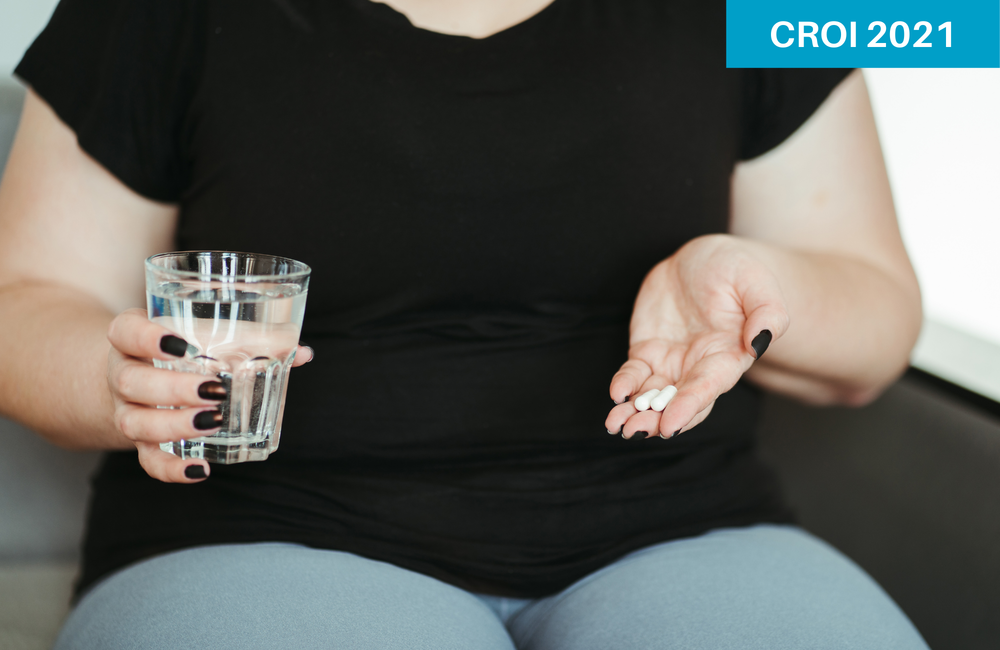
Tenofovir alafenamide (TAF) was linked to weight gain in three large studies of people changing HIV treatment presented last week at the virtual Conference on Retroviruses and Opportunistic Infections. Each study identified TAF as a contributor to weight gain but produced conflicting findings on the role of integrase inhibitors.
TAF in combination with emtricitabine is included in several of the more commonly prescribed antiretroviral combinations, including Biktarvy (with bictegravir), Genvoya (with elvitegravir), Odefsey (with rilpivirine), Symtuza (with darunavir) and Descovy (with emtricitabine only). Many people switched from the older formulation of tenofovir (tenofovir disoproxil fumarate – TDF) to TAF as new combination products became available.
Weight gain in people with HIV has been widely reported. A minority of people gain a substantial amount of weight after starting treatment and weight gain may place them at increased risk of heart disease, high blood pressure, kidney disease and cancers.
To put weight changes in context, Dr Jane O’Halloran of Washington University, St Louis, told a conference session on weight gain that on average, people starting treatment with a modern three-drug combination gained around 2kg – but around 30% showed no weight gain and a fifth experienced weight gain of at least 10%.
Early studies of the phenomenon pointed to the class of HIV drugs known as integrase inhibitors as the cause but TAF has emerged in several studies as an independent risk factor for weight gain (see here and here). The studies presented last week at CROI provide further evidence, and presenting the largest of the three studies, Dr Loveleen Bansi-Matharu of University College London said that clinicians and people with HIV should be aware of the potential effects of weight gain associated with dolutegravir and TAF.
The three studies presented at virtual CROI 2021 looked at people who changed treatment, not people just starting treatment, so any ‘return to health’ effect of starting treatment can be ruled out.
RESPOND: dolutegravir and TAF each lead to weight gain
The largest analysis of weight gain came from the RESPOND cohort study, the international cohort consortium on infectious disease and outcomes of antiretroviral treatment. The analysis covered 14,703 people taking antiretroviral treatment in Europe and Australia and looked at the associations of newer antiretroviral drugs with weight gain of at least 7% of body mass index (BMI) after starting the new agent. Thirty-nine per cent of the cohort were taking an integrase inhibitor at baseline.
The cohort was predominantly male (74%), White (91%) and treatment-experienced (80% on antiretroviral treatment at baseline).
Participants were followed for a median of 2.6 years and underwent a median of four weight measurements during follow-up. The study measured weight gain associated with each drug initiated from 2012 and compared the odds of weight gain of 7% or more compared to lamivudine.
Just over half of participants (54%) experienced weight gain of at least 7% of BMI (e.g. an increase from 25 to 26.75) during follow-up. Four antiretroviral drugs were associated with an increased odds of weight gain in multivariate analysis: the integrase inhibitor dolutegravir (OR 1.28, 95% CI 1.18-1.39), the integrase inhibitor raltegravir (1.38, 95% CI 1.21-1.58), TAF (OR 1.43, 95% CI 1.27-1.60) and the non-nucleoside reverse transcriptase inhibitor etravirine (OR 1.33, 95% CI 1.09-1.61).
Weight gain of at least 7% of BMI was also associated with being underweight at baseline (OR 2.10, 95% CI 1.91-2.31) and Black ethnicity (OR 1.59, 95% CI 1.45-1.74).
The odds of weight gain associated with dolutegravir and TAF were higher when the two drugs were used together (dolutegravir plus TAF vs dolutegravir : OR 1.73 vs 1.20; TAF plus dolutegravir vs TAF alone: OR 1.63 vs 1.30).
Both dolutegravir and TAF were independently associated with higher odds of weight gain of at least 30% of BMI (e.g from 24 (normal) to 32 (obese)). Exposure to each drug doubled the risk of gaining this amount of weight, although the overall frequency of this outcome was not reported.
Trio: no difference between integrase inhibitors, while TAF leads to weight gain
To investigate how prior tenofovir use, or a switch from TDF to TAF, affected weight gain in people taking an integrase inhibitor, Professor Grace McComsey and colleagues looked at 2272 people receiving HIV care at major clinics in the United States and London (the Trio Outcomes database). All participants were virologically suppressed and switched to a new integrase inhibitor regimen, including 64% who had previously been on a different integrase inhibitor. Forty seven per cent switched from TDF to TAF at the same time.
Study participants switched to elvitegravir (39%), bictegravir (31%), dolutegravir (51%) or raltegravir (2%). A higher proportion of those taking dolutegravir were women or African American compared with other agents, and less likely to have taken an integrase inhibitor previously, whereas a previous switch from TDF or TAF was more common in those taking elvitegravir. At least 60% of those taking each integrase inhibitor were either overweight or obese at baseline.
"Each study asked different questions and was designed differently, but each came to the same conclusion."
Participants gained an average of 1.3kg in the year following the switch, with no difference in mean weight gain between agents. However, weight gain of at least 3% was more frequent in those taking elvitegravir compared to bictegravir (41% vs 35%, p = 0.031). Weight gain of at least 10% was more common in those taking dolutegravir compared to bictegravir (10% vs 6%, p = 0.03).
Multivariable analysis adjusted for baseline characteristics, prior treatment and TDF-to-TAF switching showed that there was no difference in weight gain according to integrase inhibitor. Weight gain of at least 10% was more likely in women (adjusted rate ratio 2.2, 95% CI 1.5-3.2), people underweight or normal weight at baseline (aRR 2.3, 95% CI 1.7-3.1), those switching from a prior non-integrase regimen (aRR 2.2, 95% CI 1.2–4.1) and those switching from TDF to TAF (aRR 1.6, 95% CI 1.1-2.4).
The study investigators say it is important to control for demographics and switches from TDF to TAF when considering the effects of integrase inhibitors on body weight.
HIV Outpatients Study: early weight gain after switching due to integrase inhibitors
However, an analysis of the HIV Outpatients Study found that switching to an integrase inhibitor was independently associated with weight gain and that the greatest weight gain occurred in the first eight months after switching. Thereafter, further weight gain was largely attributable to TAF use.
The HIV Outpatients Study covers eight clinical centres in the United States. The analysis by Dr Frank Palella looked at changes in body weight from 2007 to 2018 in all patients switching to a new regimen after at least one year of fully suppressive treatment on a previous regimen. The analysis included 736 people who switched to either an integrase inhibitor or TAF, or both. Approximately 20% were female, 26% Black and with a median age of 51 years.
Participants were followed for a median of 2.5 years after switching. Of those who switched to an integrase inhibitor (60% of all switchers), 40% switched to raltegravir, 32% to dolutegravir and 25% to elvitegravir. Forty-two per cent switched to a regimen containing TAF, including 25% of the entire sample who switched to both an integrase inhibitor and TAF.
Weight gain after switching was greatest in those who switched to both an integrase inhibitor and TAF, in the first eight months after switching (p < 0.001) but subsequently followed a trajectory similar to weight gain experienced by those who switched to a non-integrase inhibitor regimen. Eighty-seven per cent of the weight gain in the first eight months was attributable to the integrase inhibitor component of the regimen in those who received TAF too, but after this point, 73% of the weight gain was attributable to TAF, the researchers calculated.
As in the previous study, there was no significant difference in the rate of weight gain between integrase inhibitors. Demographic factors or baseline weight did not affect the rate of weight gain.
Summary
Each study asked different questions and was designed differently, but each came to the same conclusion: TAF contributes to weight gain in people who are already treatment-experienced when they start taking the drug. How it might lead to weight gain, and why there might be an interaction with integrase inhibitors – especially dolutegravir – needs further investigation.
Bansi-Matharu L et al. Association between newer antiretrovirals and increase in body mass index in RESPOND. Conference on Retroviruses and Opportunistic Infections, abstract 507, 2021.
Update: Following the conference presentation, this study was published in a peer-reviewed journal:
Bansi-Matharu L et al. Contemporary antiretrovirals and body-mass index: a prospective study of the RESPOND cohort consortium. The Lancet HIV, 8: e711-e722, November 2021.
DOI: https://doi.org/10.1016/S2352-3018(21)00163-6
Palella F et al. Weight gain among PWH who switch to ART containing INSTIs or TAF. Conference on Retroviruses and Opportunistic Infections, abstract 504, 2021.
Update: Following the conference presentation, this study was published in a peer-reviewed journal:
Palella F et al. Weight Gain and Metabolic Effects in Persons With HIV Who Switch to ART Regimens Containing Integrase Inhibitors or Tenofovir Alafenamide. Journal of Acquired Immune Deficiency Syndromes, 92: p 67-75, January 2023.
DOI: 10.1097/QAI.0000000000003101
McComsey G et al. Weight gain after switching different integrase strand transfer inhibitors (INSTIs). Conference on Retroviruses and Opportunistic Infections, abstract 503, 2021.

